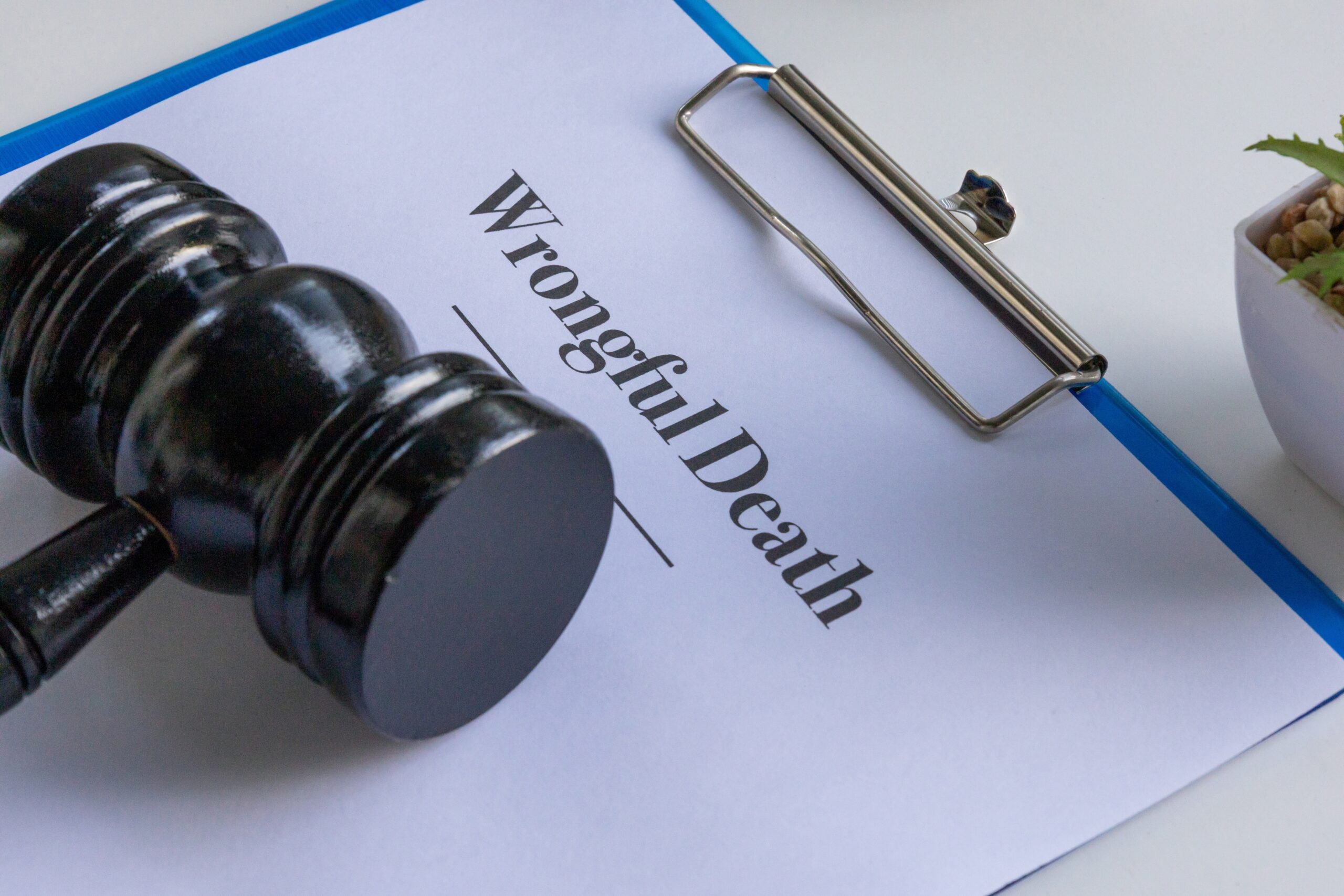Losing a loved one in a car accident is one of the most devastating experiences anyone can endure. The pain is overwhelming, and the emotional and financial consequences can feel insurmountable. On top of the grief and shock, there may be many unanswered questions about what went wrong, who is responsible, and how to move forward.
When another party's negligence causes such a tragic loss, you may have the right to file a wrongful death claim with the help of a Minnesota wrongful death lawyer. While no legal action can ease the profound pain of losing someone you love, it can provide a sense of justice and financial security during an incredibly difficult time. If you're considering a wrongful death claim after a car accident, this guide will walk you through what you need to know and help you understand the steps in the process.
What Is a Wrongful Death Claim?

A wrongful death claim is a legal action brought forward by certain family members of someone who has died due to another party's negligence, carelessness, or intentional wrongdoing. Think of it as a way to hold the responsible party accountable for the loss of your loved one and seek financial compensation for the hardships caused by their actions.
Car accidents are among the most common causes of wrongful death claims. These accidents could involve reckless drivers speeding through intersections, distracted drivers glued to their phones, drunk drivers disregarding lives on the road, or even defective vehicle parts that cause fatal collisions.
Ultimately, a wrongful death claim is about creating accountability and offering the surviving family members a level of justice for the enormous void left by the loss of their loved one.
Civil Cases Versus Criminal Cases
Some families believe that before a wrongful death lawsuit can be filed, any pending criminal charges must be resolved. This is a misunderstanding. Criminal charges may be filed after a car accident resulting in someone’s death, but this is separate from a wrongful death claim.
Wrongful death claims are civil actions. The level of evidence that a person was operating a vehicle negligently is different in a civil case than it is in a criminal case. One must only show that it was more likely than not that the accident resulted in someone’s death and that there were losses associated with the death.
This is a lower level of proof than what would be required for criminal charges. While a guilty plea or finding in a criminal case would strengthen a civil wrongful death claim, it is not a requirement for filing a wrongful death suit.
Who Can File a Wrongful Death Claim?
One of the first things to understand about wrongful death claims is who is eligible to file. Laws concerning wrongful death vary from state to state, but in most cases, immediate family members are the ones who can pursue a claim. This typically includes:
- The spouse of the deceased: The surviving spouse often has the primary right to file a claim.
- Children of the deceased: If the deceased had children, they may also have a right to file.
- Parents of the deceased: If the deceased did not have a spouse or children, the parents may have a right to bring the claim forward.
If the immediate family listed above is not available, other relatives or individuals financially dependent on the deceased (such as siblings or domestic partners) may be allowed to file, depending on the circumstances and state laws.
If you're uncertain about your eligibility to file a wrongful death claim, don't hesitate to seek legal guidance. Understanding your rights is an important first step toward justice for your loss.
What Can You Be Compensated For?
The purpose of filing a wrongful death claim is to receive compensation, often referred to as damages, for the losses caused by the death of your loved one. While no amount of money can replace their presence in your life, these damages are intended to ease financial burdens, recognize the impact on your family, and provide justice.
Common types of compensation in wrongful death claims include:
- Medical Expenses: If your loved one required medical treatment following the accident before they passed away, the cost of that treatment can be included in the claim.
- Funeral and Burial Costs: Funerals are expensive, and these costs can often be recovered through a wrongful death claim.
- Lost Income and Benefits: If your loved one was a provider for the family, you may be compensated for the income they would have earned to support you over their lifetime.
- Loss of Companionship: This includes the emotional pain and suffering resulting from losing the love, guidance, and support of your family member.
- Household Contributions: You may be compensated for the loss of daily assistance your loved one provided, such as childcare, home maintenance, or other essential tasks.
- Punitive Damages: If the action that caused the death was especially reckless or malicious, punitive damages may be awarded as a way to punish the wrongdoer and deter similar behavior in the future.
When filing a claim, it’s important to assess the unique impact of your loss. Your claim should reflect the specific ways your loved one contributed to your life and well-being.
The Importance of Filing a Wrongful Death Claim After a Car Accident
The decision to file a wrongful death claim may seem difficult. However, holding someone responsible for the financial losses a family faces can help a family recover and help provide the groundwork for a more solid future without the financial support of the decedent. Seeking justice on behalf of your loved one can also offer some sense of closure for the grieving family.
When a family contacts an attorney with experience dealing with these types of claims, they can help review the claim, determine the financial losses a family will suffer, and make a settlement demand to the right insurance company. They can also help with negotiations and other issues that a family would otherwise have to deal with on their own.
When Should You File a Wrongful Death Lawsuit?
It’s important to act promptly when filing a wrongful death claim because laws dictate how long you have to pursue legal action. This is known as the statute of limitations.
Wrongful death statutes of limitations vary by state, but they are typically within one to three years of your loved one’s death. If you miss the deadline, you may lose the ability to seek compensation entirely, no matter how strong the case. That’s why it’s crucial to consult with an attorney as soon as you feel ready to begin exploring your options. Early action can also help preserve evidence and increase the likelihood of success.
Steps to File a Wrongful Death Claim
The process of filing a wrongful death claim may feel challenging, particularly when you’re already dealing with grief. While every case is different, most wrongful death claims follow these general steps:
Investigate the Incident
Understanding how and why your loved one lost their life is the foundation of a wrongful death claim. Evidence will need to be gathered, such as police reports, accident scene photos, witness statements, medical records, and possibly even expert analyses (e.g., accident reconstruction experts). This step often requires significant time and resources, but it’s essential for building a compelling case.
Identify the Responsible Party
Was the accident caused by a distracted driver? A drunk driver? A poorly maintained vehicle? A hazardous road condition? Determining liability is crucial to ensure your claim is filed against the correct party or parties.
File the Claim
Once your case is ready, the formal process begins by filing a wrongful death lawsuit. This involves drafting and submitting the necessary legal documents to the appropriate court. Your attorney can ensure these documents outline the facts, establish the cause of death, demonstrate negligence, and explain the damages you're claiming.
Negotiate for a Settlement
Most wrongful death claims are resolved through settlement negotiations before they reach trial. During this stage, your attorney will negotiate with the at-fault party’s insurance company or legal team to obtain a fair settlement. It’s important to have experienced representation during negotiations, as insurance companies often try to minimize payouts.
Proceed to Trial (If Necessary)
If settlement negotiations fail or the responsible party disputes liability, your claim may proceed to trial. During a trial, the burden of proof is on your legal team to show that the death was caused by negligence and that your family has suffered measurable losses as a result. While a trial can add time and complexity to the case, it’s sometimes the best way to obtain a just outcome.
What Challenges Might You Face?
Pursuing a wrongful death claim is never simple. You may face challenges along the way, such as:
- Insurance Companies Fighting Back: Insurance companies often work aggressively to limit liability and reduce payouts.
- Proving Negligence: Showing that another party acted negligently and caused your loved one’s death can be complex.
- Navigating Court Procedures: Wrongful death claims involve detailed legal processes that can be difficult to manage alone.
- The Emotional Toll: Reliving the events of the accident or discussing painful details can be overwhelming.
Having professional legal guidance can help address these challenges and make the process as smooth as possible, allowing you to focus on healing.
How to Prepare for This Process Emotionally

While understanding the legal side of wrongful death claims is important, it’s equally vital to care for yourself emotionally as you go through this process. Losing someone you love is a deeply personal and unique experience. There’s no “right” or “wrong” way to grieve, and no timeline for when things will feel easier.
During this time, consider seeking support from your family, friends, or a counselor. Lean on loved ones so you don't feel alone while navigating legal proceedings. If pursuing a legal claim starts to feel overwhelming, remember that you don’t have to do this alone. Trusted professionals can provide the guidance you need while protecting your rights every step of the way.
How Much Does It Cost to Hire a Wrongful Death Lawyer?
There is little doubt that a family is facing financial instability when they lose a loved one. For some, this makes them hesitant to seek guidance from an attorney who can help them with their claim.
Here are some of the facts that everyone should know when contacting a wrongful death lawyer.
- Consultations are free: Contact a lawyer and ask for a free consultation. This will allow a family to find out what legal options are open to them and provide the information they need to make the right decision for their family.
- No legal fees unless successful: Wrongful death lawyers take cases on a contingency fee basis. This means that unless and until there is a final settlement, there are no legal fees due. There may be other fees for documents or filings, but there are no fees for legal services.
Many cases do not wind up in court. Most are settled outside of court once an attorney can demonstrate the full extent of a family’s losses and the insurer knows the attorney is advocating on behalf of their client. Insurers have attorneys working on their behalf, and victims should have an aggressive advocate.
While there is nothing an attorney can do to help ease the emotional pain and suffering a family feels while grieving a loved one, it is important to reach out and ask for advice. If you have lost a loved one in a car accident, contact a Minnesota personal injury lawyer today to fully understand the available legal remedies.
How Nicolet Law Accident & Injury Lawyers Can Help

At Nicolet Law Accident & Injury Lawyers, we understand how unbearable the loss of a loved one can feel. We also understand the challenges involved in navigating your family’s future after such an unimaginable tragedy. That’s why we’re here—not just as legal advocates, but as compassionate professionals who care deeply about your well-being.
Our experienced team can help you take the weight of this process off your shoulders. From gathering evidence and negotiating with insurance companies to fighting for justice in court, we’ll be with you every step of the way. With decades of combined experience representing families throughout Wisconsin and Minnesota, we’re committed to seeking the justice and compensation you deserve.
We’re here to listen to your story and help you take the next steps forward. When you’re ready, reach out to Nicolet Law at (715) 377-2141 or through our online form for dedicated, personalized support. Together, we’ll fight for your future.
